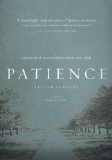| Reviews & Columns |
|
Reviews DVD TV on DVD Blu-ray 4K UHD International DVDs In Theaters Reviews by Studio Video Games Features Collector Series DVDs Easter Egg Database Interviews DVD Talk Radio Feature Articles Columns Anime Talk DVD Savant Horror DVDs The M.O.D. Squad Art House HD Talk Silent DVD
|
DVD Talk Forum |
|
|
| Resources |
|
DVD Price Search Customer Service #'s RCE Info Links |
|
Columns
|
|
|
Patience (After Sebald)
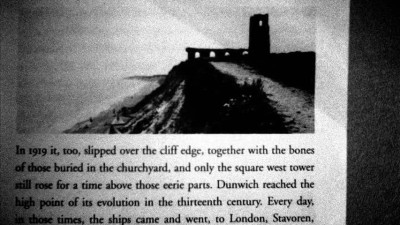
It's always quite a risky undertaking when a filmmaker attempts to bring a novel to the screen, but the novels of the late, great W.G. Sebald (Austerlitz) pose an even more forbidding, less surmountable challenge. As one of the interviewees in Grant Gee's Patience (After Sebald) -- the person at his British publishing house responsible for labeling books so retailers will know how to shelve them -- reminds us, the "novels" of Sebald were literally uncategorizable; told, ostensibly, in the first-person voice of Sebald, they are known and celebrated for their "meandering" variations on themes, their free-associative style that some have likened to Virginia Woolf, and Sebald himself couldn't (or wouldn't) say whether they fit better into the fiction, (auto)biography, travel, or essay/nonfiction section of your local bookseller. But anyone who's been enraptured and transported by Sebald's literary ingenuity and deep, urgent sense of history and memory understandably wants to share it somehow, and so, Gee (initially a maker of music videos, whose documentaries on Radiohead (Meeting People is Easy), Scott Walker (30 Century Man) and Joy Division have received accolades) has figured a way to entice us into the world of Sebald, narrowing his focus down to just the author's most highly acclaimed, devastating book, 1995's The Rings of Saturn, and adopting a hybrid documentary/illustrative/contemplative style that intersperses interviews with readings from the book and footage (or filmed still images) of the places, memories, and processes described therein.
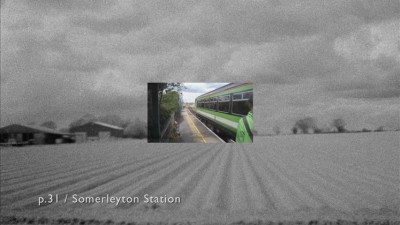
Sebald's writings typically use the direct experience he's supposedly recounting (in the case of Rings of Saturn, a walking tour of the Northeastern coast of his adopted country, England) as a touchstone, a pretext, even a ruse to kindle the ever-further unfolding, expansive, far-reaching associative explorations of which he constantly proves himself especially, exquisitely capable; you almost always end up somewhere far, far away in time and space from where you started, but the trail is brilliantly illuminated, the connections subtly but exhilaratingly made, even if you sometimes have to trace them back. Gee has wisely discerned the ability of cinema to do something similarly associative: He takes the immediate, literal fact of Sebald's text -- occasionally cutting to a close-up of an open copy of The Rings of Saturn, voice-over narrator Jonathan Pryce (Brazil), among others, reading certain relevant passages, with either the reader or the place being described appearing onscreen -- and then lets the image and sound segue and segue again, insetting color video shots against a black-and-white backdrop to create visual/temporal layers, bringing in overhead map-views (both direct and Web-based) and archival footage from World War II and beyond (even outer space), mimicking Sebald's evocation of the teeming, sometimes world-spanning history behind every location and landscape, whether of his adopted country or his native Germany (most of The Rings of Saturn's haunted roads, no matter how unlikely, lead to the Holocaust, whether through implicit allusions/suggestions or frank associations). Gee's visual palette consists of high-def digital-video black-and-white, with the aforementioned color insets, and, often and most gloriously, an alternate black-and-white, very grainy, saturated-looking 16mm, which uncannily replicates the effect attained by Sebald (through an idiosyncratic, self-invented, several-step snapshot/photocopy process described by an interviewee who apparently was filled in by Sebald himself) in the photographic imagery interspersed throughout his books -- just one more element rendering his literary works unusual, somewhat perplexing, and finally extremely affecting.
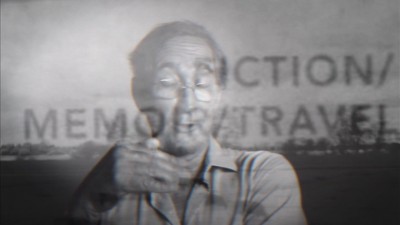
Upon the thread provided by Sebald's book, Gee also hangs commentary from a constellation of aficionados, compatriots, and friends, from Sebald-obsessed American academics like Lise Patt, who have mapped and connected all the places actually mentioned in The Rings of Saturn (resulting in a cartographic visual aid featuring crisscrossing lines bouncing out from Sebald's Suffolk walking-tour locations, to various points around the globe, especially in Europe, and back again) to fellow writers (American novelist Rick Moody (The Ice Storm) and British literati including Dan Grettan, Iain Sinclair, and Marina Warner, primarily visual artists Tacita Dean and Jeremy Millar, poet Andrew Motion, filmmaker Chris Petit, etc. -- all creative spirits who feel a deep affinity with, and stand in admiring awe of, Sebald's way of so amazingly spinning out richness from his seemingly plain material, playing with concepts of time, place, history, geography to such profound effect. To these voices (heard over Gee's footage illustrating Sebald's journey as often as the speakers appear onscreen) are added those of people more intimately acquainted with Sebald -- his fellow German expat and writer/translator Michael Hamburger and Sebald's British editors Bill Swanson and Christopher Maclehose -- with everyone either reading passages from The Rings of Saturn, commenting or expanding upon events, places, ideas, and themes Sebald has put forth, or simply doing their best to articulate the author's difficult-to-verbalize genius, creating an informative, impassioned chorus of tribute. (Sebald's own voice, from a 2001 interview with KCRW public radio's Michael Silverblatt, is heard, too.) It's all buoyed by a soundtrack credited to the musical entity known as "The Caretaker" (electronic composer James Kirby) that aptly uses piano-based, either classically-inflected or Enoesque-ambient soundscapes to pull us even deeper into the Sebaldian world of melancholy but insatiable inquisitiveness and exploration.
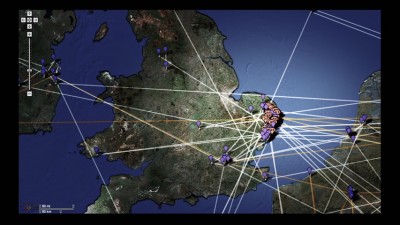
One might well wonder what the point is of making a film like Patience, which, fine as it is, is absolutely no replacement for an actual reading of Sebald. But it works so beautifully precisely because it has no intention of "adapting" or standing in for the book it riffs so eloquently upon. Gee works with the foreknowledge that he's only in service to a literary master, and that his film is not nearly so much an adaptation as it is an homage, a supplemental, complementary experience for viewers who've read Sebald and a deeply intriguing introduction for those who haven't (and well worthwhile in either case). It's decidedly more difficult than it might seem for any of us to share our passion for our beloved, venerated creative heroes, but Gee, with the resources put at his fingertips by his metier, is in an unusually suitable position to communicate his love for a favorite author in a way that's effective, meaningful, and moving. Patience is the best kind of hero-worship: Without any bombast or self-indulgent effusions, but with plenty of thoughtfulness and discipline, it convinces you, in myriad beautiful and compelling ways, of its subject's heroism.
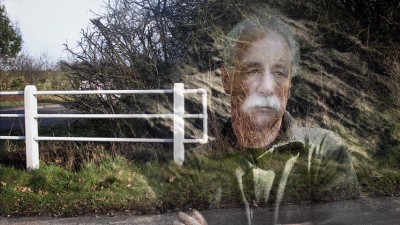
THE DVD:
Presenting the film anamorphic-widescreen at an aspect ratio of 1.78:1 (slightly misidentified on the sleeve as 1.85:1), the transfer Cinema Guild presents is gorgeous, nearly flawless; there may be the barest, most ghostly rare hint of edge enhancement, but otherwise, the different black-and-white textures, intermingled with color video, that Gee has attained appear rich and true to the source, with copious texture in the portions shot on celluloid (there's nothing quite like blown-up 16 mm, and it's used both aptly and flat-out beautifully here). No aliasing or other compression artifacts mar what is overall an excellent visual presentation.
Sound:The Dolby Digital 2.0 soundtrack offers crystal-clear, rich, sonorous voices and all the low nuances (sometimes near-subliminal) of The Caretaker's deep score, without a trace of imbalance or distortion anywhere.
Extras:--"Ambient Visual Presentation of the Film by 'The Caretaker'". a 20-minute visual piece in which the main part of the post-rock orchestral score for Patience, created by The Caretaker (aka electronic musician James Kirby, working in a Brian Eno/Godspeed You Black Emperor! vein), is accompanied by some of the more haunting footage Gee shot for the main documentary. It's like a crystallization of the purely emotional, wordless elements of the film, and it makes for an apt, complementary supplement.
--A gallery of Cinema Guild trailers advertising eight or so other films (from Marwencol to The Turin Horse) that are also very well worth your attention.
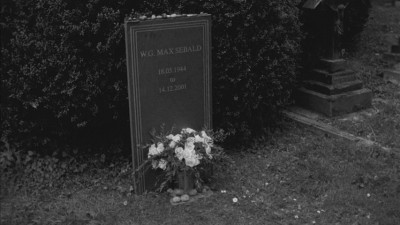
Whether you've never heard of the great German-British writer W.G. Sebald, are vaguely familiar, or are one of his many ardent admirers, Grant Gee's documentary Patience (After Sebald) is a surprisingly insightful tribute to the writer, as well as a remarkably adept transposition of his sensibility to the screen -- something anyone only familiar with Sebald's writings would surely consider next to impossible. Following in the footsteps of the excursion detailed in one of the most acclaimed of Sebald's first-person travelogues/memoirs/fictions/allusive meditations, The Rings of Saturn, the film takes us on a far-ranging journey that encompasses the book itself -- its profound, seemingly free-associative, networking contemplations of place, displacement, troubled history, and strange, utterly unexpected/unpredictable, and exhilarating connections -- and a generous amount of thought and commentary on it and its author by a variety of colleagues and fellow artists/writers who knew Sebald or have been influenced in some way by his work. It's a rich, heady film that, in a way similar to Sebald's work, carries you along with it to the most unpredictable yet exactly right places. An inspiring piece of cinema on its own merits, it's hard to imagine a better, more quietly urgent inspiration than Patience to revisit the sublimity of Sebald's uncategorizable "novels" -- or, if you haven't yet had the disorienting, mind-blowing pleasure of getting lost in one of them, to immediately seek out the tantalizing opportunity. Highly Recommended.
|
| Popular Reviews |
| Sponsored Links |
|
|
| Sponsored Links |
|
|
| Release List | Reviews | Shop | Newsletter | Forum | DVD Giveaways | Blu-Ray | Advertise |
|
Copyright 2024 DVDTalk.com All Rights Reserved. Legal Info, Privacy Policy, Terms of Use,
Manage Preferences,
Your Privacy Choices | |||||||









